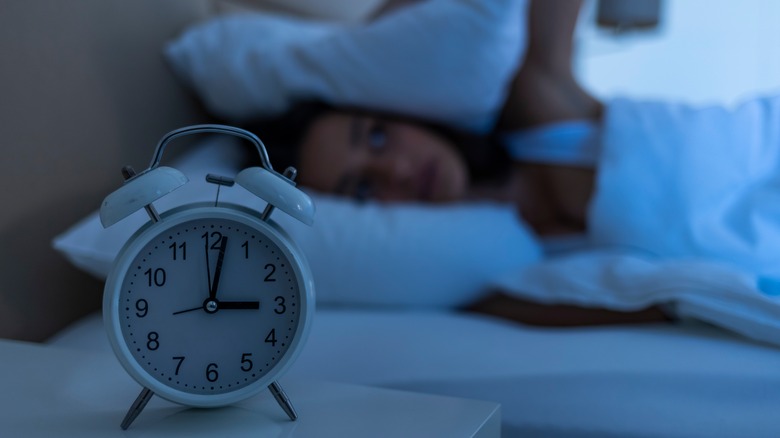Does A Lack Of Sleep Affect Your Appetite?
Has tossing and turning at night become the norm when trying to sleep? Unfortunately, sleep deprivation can have serious consequences on both the body and mind. According to Healthline, adults between 18 and 64 years of age should be getting between 7 and 9 hours of sleep at night, while older adults might need slightly less (between 7 and 8). And while Healthline points out that lack of sleep can affect cognitive performance and productivity and increase your risk of developing Alzheimer's disease, one less known consequence of not-enough shut-eye is obesity.
According to The Sleep Foundation, sleep is necessary for the production of a number of hormones that regulate appetite. This includes two important hormones that balance each other out: leptin, which helps control appetite and regulate fat storage, and ghrelin, which boosts appetite and fat production.
On a well-rested and healthy body, these hormones are in good balance, so you feel hungry enough to eat but also feel satiated after eating enough. Once these hormones are no longer well-balanced, however, you might find yourself feeling hungrier and overeating.
Plus, WebMD points out that lack of sleep can also affect the hormones that balance your blood sugar and could therefore increase your risk of developing diabetes. This may be in part because people who get insufficient sleep are more likely to choose unhealthy foods or simply eat more — because raising blood sugar means you'll be hungrier and have more cravings, according to the American Diabetes Association.
The connection goes beyond hormones
In a study published in Nature Communications, researchers looked closely at the link between sleep deprivation and obesity and discovered that people who are sleep deprived are more likely to choose high-calorie foods and experienced an increased caloric intake. They found that people with sleep deprivation had an increased food desire, even though they weren't necessarily more physically hungry than people who were more rested. In short, lack of sleep creates an impulse to eat more and can lead to binge eating and weight gain.
A systematic review and analysis of previous studies published in the European Journal of Clinical Nutrition confirms this, adding that people who are partially sleep deprived eat an average of 385 calories more than those who are well-rested but they don't necessarily exercise more.
Plus, research shows there's a link between lack of sleep and a high body mass index (BMI), which provides support to the idea that people who are sleep deprived may eat more and experience weight gain as a result (via The Sleep Foundation).
Forbes points out that poor sleep and poor eating often become a cycle — you sleep less so you make unhealthy food choices and then those food choices affect the quality of your sleep. And the choices aren't necessarily physical either. People who are tired from lack of sleep may find "rewarding foods" — think a donut over a salad — a more appealing choice.


